Text
Actually
The question I get the most is how I write characters that feel like real people.
Generally when I’m designing a human being, I deconstruct them into 7 major categories:
1. Primary Drive
2. Fear: Major and Secondary
3. Physical Desires
4. Style of self expression
5. How they express affection
6. What controls them (what they are weak for)
7. What part of them will change.
1. Primary Drive: This is generally related to the plot. What are their plot related goals? How are they pulling the plot forward? how do they make decisions? What do they think they’re doing and how do they justify doing it.
2. Fear: First, what is their deep fear? Abandonment? being consumed by power? etc. Second: tiny fears. Spiders. someone licking their neck. Small things that bother them. At least 4.
3. Physical desires. How they feel about touch. What is their perceived sexual/romantic orientation. Do their physical desires match up with their psychological desires.
4. Style of self expression: How they talk. Are they shy? Do they like to joke around and if so, how? Are they anxious or confident internally and how do they express that externally. What do words mean to them? More or less than actions? Does their socioeconomic background affect the way they present themselves socially?
5. How they express affection: Do they express affection through actions or words. Is expressing affection easy for them or not. How quickly do they open up to someone they like. Does their affection match up with their physical desires. how does the way they show their friends that they love them differ from how they show a potential love interest that they love them. is affection something they struggle with?
6. What controls them (what they are weak for): what are they almost entirely helpless against. What is something that influences them regardless of their own moral code. What– if driven to the end of the wire— would they reject sacrificing. What/who would they cut off their own finger for. What would they kill for, if pushed. What makes them want to curl up and never go outside again from pain. What makes them sink to their knees from weakness or relief. What would make them weep tears of joy regardless where they were and who they were in front of.
7. WHAT PART OF THEM WILL CHANGE: people develop over time. At least two of the above six categories will be altered by the storyline–either to an extreme or whittled down to nothing. When a person experiences trauma, their primary fear may change, or how they express affection may change, etc. By the time your book is over, they should have developed. And its important to decide which parts of them will be the ones that slowly get altered so you can work on monitoring it as you write. making it congruent with the plot instead of just a reaction to the plot.
That’s it.
But most of all, you have to treat this like you’re developing a human being. Not a “character” a living breathing person. When you talk, you use their voice. If you want them to say something and it doesn’t seem like (based on the seven characteristics above) that they would say it, what would they say instead?
If they must do something that’s forced by the plot, that they wouldn’t do based on their seven options, they can still do the thing, but how would they feel internally about doing it?
How do their seven characteristics meet/ meld with someone else’s seven and how will they change each other?
Once you can come up with all the answers to all of these questions, you begin to know your character like you’d know one of your friends. When you can place them in any AU and know how they would react.
They start to breathe.
82K notes
·
View notes
Text
Masterlist of Bullet Journal Ideas
I was going to post images with each listing, but 100 pictures on one Tumblr post was quite a task. So, if you’d like to see examples of any of these, I am adding them to my Pinterest Board which can be found [here].
1. Books To Read- Color them in as you go! Or make a fun list of them and check them off one at a time.
2. All About Me- Make doodles of things you love, add quotes, draw yourself!
3. Future Log- There are so many ways to make this page. Please do some research to see which would work best for you
4. Movies To Watch- Pretty self-explanatory, but there are many ways to do this page too
5. Skills To Learn- Jot down all the things you want to learn
6. Important Numbers and Addresses- In case of emergency of course. Also, be careful what you put in this part for your own privacy reasons
7. Year In Pixels- Honestly, one of my favorite pages
8. Fonts, Banners, and Frame Ideas- For practice and to choose from when you are having trouble being creative
9. Snail Mail Log- Keeping a list of people who you want to send letters to
10. Savings Tracker- It’s always fun to see how much you have saved up
11. TV Series Tracker- Keep track of all the shows you still need to binge
12. Monthly Challenges- I know I haven’t been helpful with this lately, but you can always search for challenges on my page
13. Music Playlists- A list of songs that describe you, your goals, things you love, etc.
14. Timeline of Your Life- This was hard for me to make. My life isn’t all that exciting
15. Inspiration Page- Fill it with quotes, pictures, memories, etc.
16. Self-Care List/Ideas- I posted many lists like this on my Pinterest if you want more ideas
17. Monthly/Yearly Memories- Look back on all the good and bad things that you’ve gotten over and endured.
18. Sleep Tracker- See how many hours you get each night. This also works well when paired with number 7.
19. Me Time Log- Keep track of how many hours you spend with yourself. We all need to learn to love on ourselves a little more.
20. Tiny Adventures- Go out of your comfort zone and go on some tiny adventures like reading in public, talking to a stranger, giving people compliments, etc.
21. Word Tracker- For those who are writers who like to procrastinate
22. Daily To-Do List- This can be done on your weekly pages or you can make a page specifically for daily sticky notes.
23. Blog Post Ideas- Got an idea, but you’re not at your computer or have what you need for your post? WRITE IT DOWN
24. Fitness Log- Keep track of how much and when you work out or stretch or do yoga or and of those fun physical activities.
25. Food Log- If you’re trying to lose weight or just get healthy or just want to track your food intake for fun, this is for you!
26. Meal Prep- I love how cute and helpful these pages can be.
27. Gift Lists- Ever see something and say to yourself, “Man, ____ would really like that”? Keep a list of things people would like so that you don’t worry about it when it comes to holiday time or birthdays.
28. Grocery Lists- Every time I go shopping, I forget something because I didn’t write it down.
29. Goals- Oh, yes! It’s 2018. We need some goals. Monthly, weekly, daily, YEARLY. Just get some goals and aim for them.
30. Recipes To Try- I see nice recipes all the time on Facebook, but I never think about them again after I keep scrolling. It’s bad.
31. Daily Affirmations- Give yourself some compliments and some emotional support
32. Business Plan- Make yourself a good businesswoman or businessman or businessperson in 2018. You got this.
33. Birthdays- Keep track of all those important people in your life that need to be remembered on their special day.
34. Work Hour Log- Sometimes we don’t keep track of all the things we get paid for. Actual work, babysitting, photography jobs, writing jobs, pet sitting, house sitting, etc.
35. Wishlists- Not so you can #treatyourself, but so that you can make note of things you really want.
36. Gratitude Log- It’s always good to have a moment of gratitude with yourself. Make it a monthly challenge if you need to!
37. Quotes- Your own, friend quotes, celebrity quotes, author quotes, and lyrics.
38. Illustrations and Doodles- Doodling helps you keep your mind fresh and ready to react quickly to situations.
39. Jokes- Your own, ones you heard, ones you read, etc.
40. New Discoveries and Interesting Facts- Find a new interesting fact? How about that lemonade is basically Sprite in almost any other country than America?
41. Travel Log- Places you want to go! There are so many ways to do this, so look up different versions before starting!
42. Family and Friend Favorites- Their favorite colors, animals, stores, places, hobbies, etc.
43. DIY Projects- Things you want to try out someday.
44. Chore List- Keep track of when you do your chores so that your house doesn’t become disgusting or dusty.
45. Bucketlist- What do you want to do before graduation, moving out, marriage, having kids, etc.
46. Story Ideas- I always come up with story ideas and then when I sit down to write them, I blank.
47. Period Log- For people with periods that have many PMS symptoms or even PMDD symptoms. This is a great way to show your doctor all of the things you go through each cycle.
48. Words That Make You Happy- Silly words, ugly words, words that are fun to say, etc.
49. Things That Make You Happy- People, places, and things.
50. Monthly Habits- Water intake, cleaning, bathing, exercising, reading, etc.
51. Story Titles- This can be titles for books, short stories, poems, or just nice sounding titles for anything.
52. Made Up Words- I make myself laugh with all the words I make up on the daily.
53. Follower Counter- This page keeps me inspired to keep doing what I love.
54. Index- Always have an index for easy access to the pages you want to find.
55. Icons- Sometimes we need to have icons to make our pages pretty. Sometimes we make too many icons and never use them (me).
56. Packing List- For those who travel often or stay at friends’ houses more than our own, it’s good not to forget the things we need.
57. Morning Routines- Our bodies need routines for mornings to get us ready for the day.
58. Nightly Routines- Our bodies need routines for nights to prepare us for sleep. (see what I did there?)
59. Weight Tracker- If you’re struggling with your weight, keep a chart tracker or add your daily weight to your calendar.
60. Pen Test Page- If you get new pens, highlighters, or markers, its best to test them out before using them.
61. Brain Dump- Sometimes we just need to jot down ideas or thoughts. It’s okay if they don’t make sense.
62. Spending Log- Keep track of what you spend because you might need that someday.
63. Water Tracker- HYDRATE
64. Habit Tracker Reward System- This is something I came up with myself, so if you have questions, message me!
65. Name Lists (For Babies and Stories)- Keep a list of cool names for characters or even future babies.
66. Looking Forward To…- Birthdays, holidays, raises, pay days, vacations, etc.
67. Compliment Lists- Make a list of your go-to compliments, your favorite ones people have given you, etc.
68. Level 10 Life- Please look up what this is before jumping into it!
69. Pet Care Log- Keep track of how much you do with your pets. Walks, play time, park time, play dates, baths, etc.
70. Achievements- What have you done that you are proud of?
71. Weekly Log- Keep track of your week. This is one of the most used pages in any bullet journal honestly.
72. Monthly Log- Another overly used page in any bullet journal. Very important.
73. Daily Log- I don’t do this too often, but I know it helps others who really need a whole page for each day.
74. Bill Tracker- This was fun to make and something I will be using now
75. Income Tracker- How much and how frequently do you get paid?
76. Deadline Page- Prepare yourself for things that you need to get done. Do not procrastinate this year!
77. Vocabulary Practice- Sometimes we just need to educate ourselves on our own terms. (and with our own terms. Anyone? Anyone?)
78. Doctor Appointment Log- If you don’t want to add them to your calendar or they are too far out to add to the calendar you’re using.
79. Username and Password List- Be careful with this page. If someone finds your bullet journal, this could be bad.
80. Monthly Cover Page- These are so cute! I just started doing them, but they make my journal so artsy and pretty.
81. Dream Log- This is a fun one. Track your dreams. This would be good to line up with how many hours you get as well.
82. Favorites List- What are YOUR favorites? Movies, snacks, drinks, subjects, people, colors, animals, etc.
83. Habits To Break- Do you bite your nails? Quote The Office too much? Throw clothes into piles on your floor? STOP THAT.
84. Small Things That Matter- Puppies, getting up in the morning, pennies, smiling at yourself, laughter, etc. Remind yourself that there is good in the world.
85. Things To Sell- Get rid of the things you don’t need. Or make things to sell! Be prosperous this year.
86. School Schedule- High school and college students really need this. Even teachers do too. Make a chart of your classes, room numbers, buildings, and times.
87. House Projects- Things that need fixing or improvements around the house.
88. Day Trip Ideas- Fun places to go when you have the time.
89. Things I Am Bad At- It’s okay to admit our shortcomings and work on them. Or just accept them for what they are.
90. Resolutions- YES! Make yourself this better this year. Be the best you.
91. Crochet/Knit Log- When making a blanket, small items, or just keeping track of your improvements in your skill.
92. Future Planning- Make a list of the things you want in your future and how you plan on getting them.
93. Quirk List- Ever notice you do small little weird things? Make a list to appreciate who you are.
94. Who Borrowed What- Sometimes people borrow things and you forget until you need it again. By then, they threw it out or gave it to someone else.
95. Six Word Stories- Get those creative juices pumping.
96. Love Yourself- Write down all the things you love about yourself. Appreciate yourself.
97. Paying It Back- Honestly, a good page to have, but it doesn’t get much attention from me.
98. Childhood Dreams- We should always try to look back on what we thought we wanted
99. Good Deed Ideas- Ever think “wow, wouldn’t it be great if I could _____”?
100. Mind Mapping- There are a few reasons I really enjoy this, but it really helps me get my thoughts and ideas out more easily
25K notes
·
View notes
Video
12/19/2017 3/100 I did some reading for my Contemporary Art Theories class. Made a mindmap of Clement Greenberg's Modernist Painting as an example of formalist art theories.
#100 days of productivity#100dop#Film studies#studyblr#studyspo#studyspiration#study motivation#holiday#reading#Contemporary Art Theories#Greenberg#mindmapping#formalism
3 notes
·
View notes
Video
12/18/2017 2/100 Reading and taking notes of Seymour Chatman's the Rehotic of Narrative in Fiction and Film, "The Cinematic Narrator". Interesting account of the narrator vs. narration debate between himself and David Bordwell. It'll be definitely useful for my thesis. Also revised for the Introduction to Film Theory, and the Contemporary Art Theories courses. So (not) far, (but still) so good.
#100 days of productivity#100dop#studyblr#Writing thesis#motivation#adaptation#film student#Film studies
1 note
·
View note
Video
12/17/2017 1/100 I always kind of liked the idea of this challenge, and seeing how I'm going to spend most of next year studying and thesis writing in my MA programme, I might as well try it now. Hopefully, it'll guide me through the dark times of stress, frustration, and procrastination. This is me reading Perfume: The Story of a Murderer by Patrick Süskind for the essay due in January for my adaptation theory class.
#100 days of productivity#studyblr#motivation#Adaptation studies#adaptation#perfume#patrick süskind#novel
2 notes
·
View notes
Photo

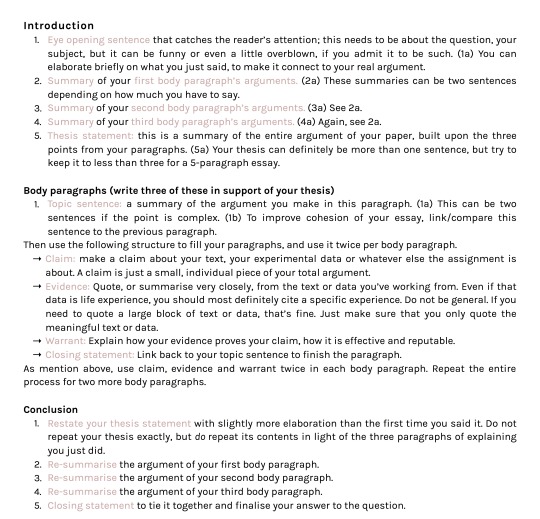

one of my lecturers printed us a step-by-step guide to writing an essay for an assignment we had. i decided to type it up and share it with you guys. i think for the most part it is really useful and a super simple way to break down your essay. hope this helps :~)
54K notes
·
View notes
Photo

hi everyone! i made a french masterpost about a year ago which can be found here, but it’s a little outdated and i don’t use some of the resources anymore. here is a new updated masterpost about how to learn french!
apps
duolingo is good to start out with, but don’t rely on it entirely. duolingo is more beneficial if you use it as a review rather than a learning resource.
memrise is amazing for any level of french!
drops is a really good vocabulary app. it exposes you to everyday vocabulary you may need while traveling to france. it’s also super aesthetic! it only allows you to use it for 5 minutes a day, but i find it perfect to use before i go to bed.
mango is offered free from libraries in the u.s. and canada. it teaches you with a conversation. this app is very practical and it helps with speaking skills. if you live outside of the u.s. message me and i can make you a free account.
mindsnacks is also a fantastic vocabulary app, but it doesn’t work with ios 11 and you have to pay $4.99 to unlock all the lessons. but if you can get it, it’s definitely worth it! the app forces you to remember all the vocab, and it pronounces everything for you very clearly.
writing/reading
write/read something every day in french! no matter what it is, it will greatly benefit your learning. try to use what you learn each day in your daily writing practice.
here is a website with french children’s books for free. it pronounces the words and offers an english translation which is great for beginners.
1jour1actu is good for A2-C1 learners. they have an app as well as a website.
for more advanced learners, i recommend lemonde.fr
there are several strategies for what to do when coming across a word you don’t know. i usually use a dictionary/google translate and highlight/write down the word i looked up, then review those words before i sleep (sometimes). the more exposure you get to words, the more familiar you will become. keep reading!
forvo is an amazing website where you can see how a word is pronounced by a native speaker. it’s a literal blessing to this earth.
grammar
it’s very important to keep a notebook for your french studies, because french grammar can get really crazy. review your notes weekly to retain the information!
pick a good textbook/workbook to take notes from. i personally used french for dummies. many free textbooks and workbooks can be found at this link, so you can choose which one you think will be best for you.
thoughtco is a good website for when you need help on a specific grammar topic. you can add some of their lessons to your notebook!
rocketlanguages is also good to start out with. same as mango, it’s free to anyone in the u.s. and canada with a library card. it’s good for conversation practice and grammar.
listening
my favorite place to go to for practice is youtube. check out this list of most popular french youtubers!
music is good for listening practice as well. if you have time, look at the lyrics while you listen. maybe memorize a song!
here’s some audiobooks!
dividing your time
a weekly schedule could look like completing 1 lesson in your textbook, reviewing previous lessons, practicing with apps, writing/watching/reading something, etc.
each day you can pick something off of the picture below! listening monday, writing tuesday, reading wednesday…
depending on how much time you have to study, spending 1(+) hour per day is a good ballpark if you want to advance easily in the language.

everyone is different, but this is how i choose to study french. i made a table with each form of practice and i choose 2-3 things off the table to study from (see the picture below). making this is helpful because you spend more time studying the language than looking for ways to study the language. everything is already there for me!
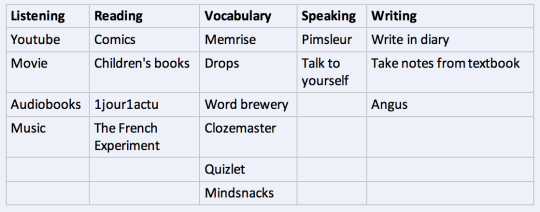
other masterposts
how i study languages by @lovelybluepanda
french resources masterpost
a french masterpost
good luck with your studies, and as always message me if you need any help!
1K notes
·
View notes
Photo
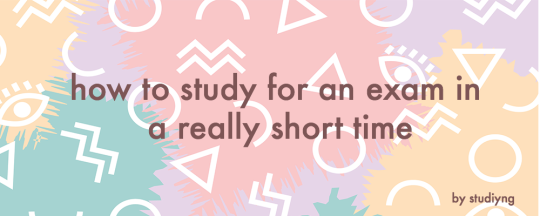
we’ve all been in this situation for different reasons, anxiety, procrastination, work, way too many assignments in a week. but fear not my friends, hopefully, this masterpost will help you get A’s and organize your study schedule.
also please only do this every time you need to study for a test, cramming is not good for learning and pulling all-nighters frequently isn’t healthy.
study tips
cramming
how to cram for a big test by @studyign
how to cram efficiently by @study-studymore-studyhard
test and cramming tips
how to cram the night before a test and pass
10 ways to cram successfully
all-nighters (the last resort)
how to pull an all-nighter and pass your exam
all-nighter survival tips by @rookiemag
how to pull and effective all-nighter
stay all night without feeling sleepy: pt1 / pt2
expert-approved guide to pulling an all-nighter
pull the most efficient all-nighter
how to pull an all-nighter
how to pull and all-nighter : from the special forces
do’s and don’ts of pulling an all-nighter
really do them if it’s absolutely necessary:
is it bad for you to pull and all-nighter
why you should never pull and all-nighter
the night before the exam
study the night before by @renaissence
study the day before by @getstudyblr
night owl study tips by @lawjournalsandwine
the night before the exam by @studyspoinspo
how to study the night before a test
the night before the exam tips
top tips for the night before and the morning of the exam
how to pass an exam if you forgot to study the night before
study the day before the exam
10 things you should do the night before a test
7 mistakes you make on the night before an exam you’ll never make again
i have less than a week to study
five day study plan by @brandi-studies
how to study for an upcoming exam by @noteblr
how to remember everything for a test in 3 days by @getstudyblr
when you have a test really soon
study well in short time
study for exams in limited time
ace an exam that’s around the corner
tips
25 study tips by @studyign
how to study more efficiently
fastest way to memorize by @studyign
common study mistakes by @studyign
tips on study last minute by @milkystudies
how to get things done by @lattenotlate
study smart not hard
10 tips to study smart and save time
useful tips to study in short time
how to study for an exam effectively
prepare for a exam in a really short time
study for an approaching exam
the secrets to study effectively in short time
nice time management advice
how to study in groups
how to stay focused by @elkstudies
finals week masterpost
22 science based tips to study for an exam
20 study hacks to imporve your memory
exam tips
tips for during the exam
15 tips to boost your exam performance
how to answer exam questions
7 last-minute exam tips
28 top tips for exams and tests
top 10 tips for taking exams
last minute revision tips
exam prep
how to mentally prepare for a test by @eruditicn
anti procrastination masterpost by @elkstudies
beat anxiety and stress in 1 hour and start studying!
how to stop procrastination
deal with exam anxiety by @attackonstudying
scientifically the best ways to prepare for an exam
motivation
how to get motivated
my motivation tag
more masterposts
app masterpost
DIY masterpost
food masterpost
how to: group work
printable masterpost
language masterpost
music masterpost
my study methods masterpost
36K notes
·
View notes
Photo

“What to do when you have too much to do”
With Studyblrheaven
1. Write it down
I have a whiteboard where I write everything down. Not only what events are coming up, but also my todo for the day. You can also use a planner or whatever you want to use.
2. Clean up
A clean room is a clean mind! The best thing to do at the end of the day is clean up your room. Not only do you sleep better in a cleaned up room, the process itself always helps me to clean up my mind too!
3. Tea
Tea. Tea is always the answer.
4. Here and now
If there is one question that has opened my eyes on the subject of overthinking, it has to be “what can you do about it NOW” it means that it is no use to keep thinking and worrying about something you can’t do anything about at that moment anyway.
5. Meditation and sleep
The most important thing in stressful times is to stay calm. Meditation really helped me. I would really to recommend the app “Stop, Breath & Think”. (My friend @zolderraam brought it to my attention) It’s a meditation app which is perfect for people like me who aren’t very experienced with meditation yet. It also looks really pretty. It is free and you get a list of 16 tracks. You can also buy other tracks to support the makers! You can also fill in how you feel and it will recommend certain tracks!
When I can’t sleep I always listen to this YouTube video, it always works for me.
I hope these 5 tips were useful to you and good luck getting done what you need to get done!
3K notes
·
View notes
Photo
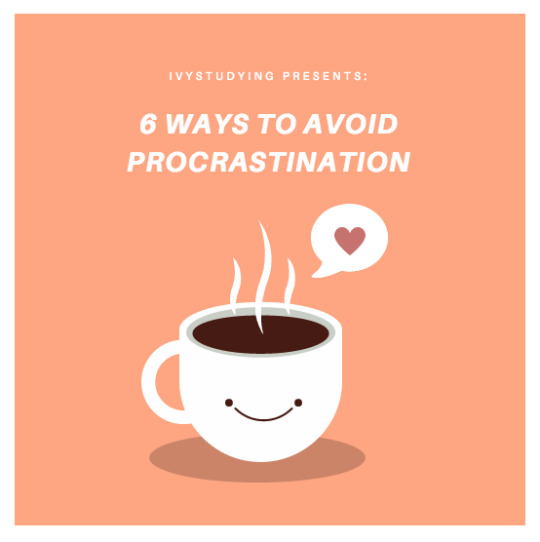

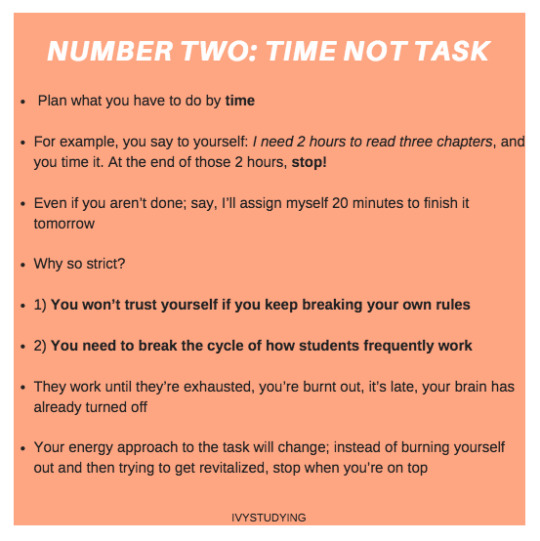




It’s been a while since I’ve made a post, and I figured that these tips might be extra helpful with exam season approaching. As someone who struggles a lot with procrastination, I do everything I can to fight the urge to put assignments off until the last minute (even though I’m not always successful).
As always, good luck! (ᵔᴥᵔ)
85K notes
·
View notes
Text
Study Tips Straight from My Professor
Hi guys! So a lot of our classes are starting today, even with the eclipse so I thought I’d share some tips my teacher sent out to help everyone get a better grade in the sciences classes, which may or may not be slightly trickier than others. It’s important to realize that no one can get through all of these, so pick what is most important to you.
1) Put in the time. Using the “three-to-one” rule, three hours of studying outside of class time per one credit hour. If your class is 3 credits, you should be studying independently an additional 9 hours. For 4 credits, 12 hours. Teachers expect you to treat studying as your job (even if you do have an actual job) meaning you should virtually be studying anytime outside of meals, class, sleep, work, etc.
> To clarify, this is per week. Not at all per day. You will never be able to shove an appropriate amount of studying per class into one day. Do not try, it is not healthy.
2) NO cramming. It is MUCH more productive to study a little each day rather than 9 hours the day before a test. You will remember virtually nothing if you do and will not be as happy with the grade you recieve. Taking it in little bits stores it in long term memory and you will actually learn it rather than just regurgitating it onto a test.
3) Time management is crucial. Especially if you are someone who works or has kids or other priorities that also need attention. Make a schedule and. Stick. To. It.
4) Be prepared and organized. Do not be the person who lost their pencil and doesn’t have an extra, forgot a notebook or textbook, keys, etc. Give yourself enough time so you’re not rushing and make sure you have what you need! Your college professors are not here to attend to your personal needs when some of them have 800+ students a semester.
5) Use a calender. Write down your assignments, projects, class times, anything you need to remember. Use it religiously because it will be so much easier than trying to keep it all inside your head and that way you will not forget anything.
6) Use the book AND the notes. Most professors write things in a different way than the book and reading something in multiple different ways will better help you remember the concept rather than the sentence word for word.
7) Read ahead. Doing so helps you prepare for and not be lost in lecture and it will benefit you as well as the teacher.
8) Attend all/as many classes as you can and be an active listener. Sit up straight, face forward, don’t pay attention to what others around you are doing (I sit up front whenever possible). Keep an extra piece of paper near you in case you have questions so you can either ask or go back later and look it up yourself.
9) Take detailed notes. With permission, record the lecture so you can hear it again later, abbreviate whatever you are scribbling down, and then as soon as you can after class, rewrite it in a neater, nicer way and don’t be afraid to word things differently. A review shortly after class is proven to help it convert to long term memory.
10) Keep your phone off in class. I know we all love our phones and class is boring, but it’s also crucial information. We’ve all been through that period of regret where we wished we had paid attention. Don’t let that happen anymore. Use it only for emergencies and recording lectures.
11) Even if you don’t rewrite your notes after class, review them. Make sure to pay attention to anything the teacher may have repeated or any learning objectives they would like for you to know.
12) Study early and often! This goes along with no cramming but the sooner and more repetitively you relay information to your brain, the easier it will be to remember it. If you don’t look at the information for 2 weeks and then suddenly need to remember it all, not only will you be too stressed to retain it, you’ll also be wasting valuable time. Make your own study guides and test questions.
13) Make flashcards. Flashcards are only useful when you a) shuffle them occasionally and b) take the ones you’ve memorized out of the pile but still review them every now and then to make sure you still remember. Put any back in the pile that you missed.
14) Use mnemonic devices for lists of related terms.
15) Type or rewrite your notes. I’d recommend writing them again, because physical writing by hand is another way to help remember it.
16) Consolidate your material. This means: tables, lists, figures, concept maps. Reasonable chucks.
17) Teach it to someone else. The best way to tell if you have mastered something is that you are able to explain it to someone else correctly in a way that makes sense.
18) Pick a good place for effective studying. We all love our study groups, but let’s be honest. At most the first 20 minutes is talking, then 10 minutes of studying before half the group is surfing Tumblr and the other half is complaining they’re hungry. I prefer to study by myself for this reason. Find a quiet place with minimal distractions and get prepared to work your fucking ass off.
19) Get decent rest before the exam and be sure to get there early or on time, unpredictable situations included. Exams are important and your teacher will not care if there was a traffic jam. If you miss the exam, you miss the exam.
20) Learn from your mistakes. Review your incorrect exam answers and figure out why it was wrong and why the correct answer was correct. Talk to your teacher, TA, resource lab, anyone who may help you if you’re stuck.
21) Review the midterm and start preparing for finals. Most of the midterm material should be on the final, so it’s one of your best study guides.
22) Keep your textbooks and notes. I know we’re all broke as fuck and would like to sell them back, but you never know when that information will be useful in another class down the road.
23) Do NOT discuss grades, quizzes, tests, or exams with your class mates. Of course they’ll complain that they didn’t study, that chapter 6 was this, or chapter 8 said that and it was confusing. This type of conversation will only make you nervous so steer clear of all of it.
Edit: I have made an adjustment to #2 to clarify that the 3 hours of studying/1 credit hour for that class should be per week, not per day. 💕
15K notes
·
View notes
Photo

Edge of a Wood 1882
Vincent van Gogh
171 notes
·
View notes
Photo

The Ballad Singer by Henry Robert Morland 1764.
432 notes
·
View notes
Photo

Pieter Neefs the Younger & Frans Francken III - The nave of Antwerp Cathedral.
89 notes
·
View notes
Photo

Leeds Castle, UK *by ovofrito
5K notes
·
View notes
Photo

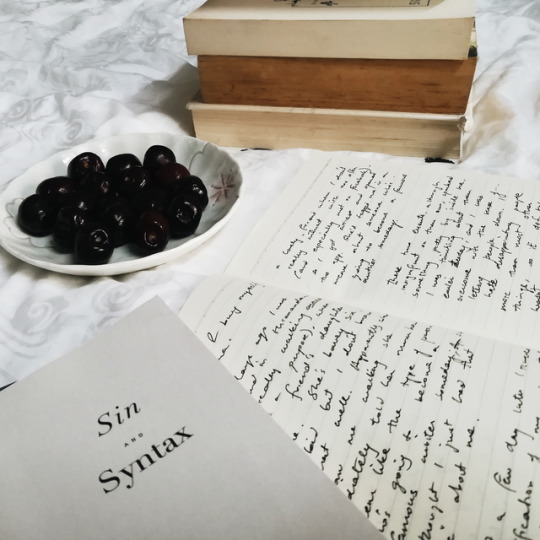
Some of the best books I’ve read over the past year.
6K notes
·
View notes
